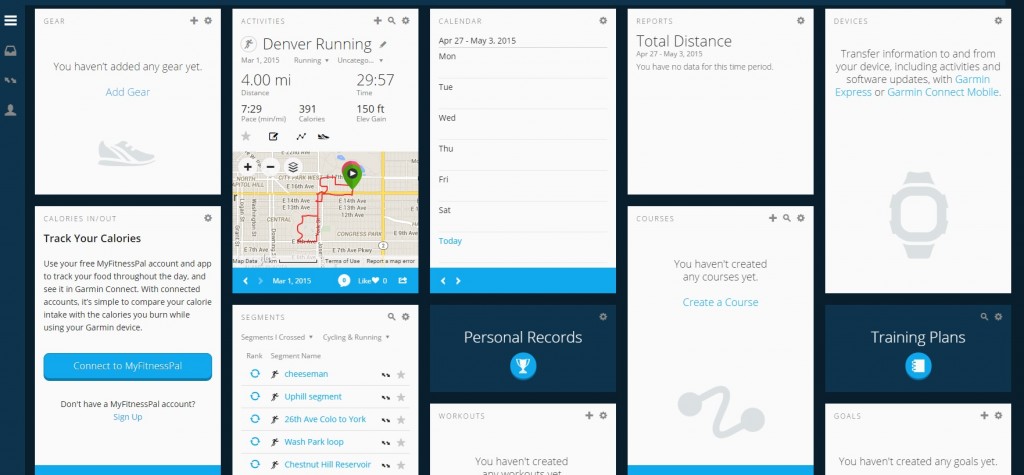There’s a never-ending supply of new fitness devices and data trackers available today – but is all that information actually helping you become a better runner?

I wouldn’t even be surprised if you own more than one of these gadgets!
- GPS watches like Garmin, Soleus, Timex, etc.
- Wearables that track steps, calories burned, flights of stairs climbed (like the FitBit, which I wrote about here)
- Apps that monitor distances, speeds, and compare them with previous performances
- Devices that measure lactate threshold with lasers (not kidding)
- Power meters for runners
But with all the new technology that allows us to look deeper into our workouts, it’s critical to ask: Are they actually helping us become better runners?
That’s the goal, after all. If your new $400 device gives you all this fancy data, but you’re not sure what to do with it, then is that device even helpful?
No, no it’s not. And let’s not also forget the dirty little secret that wearable manufacturers never advertise: most people let their devices gather dust after just a few months.
Tech Republic reported that more than half of consumers no longer use their wearables – and one-third of survey respondents lost interest within six months.
I’ve previously written about my distaste for GPS watches (even though I wear mine for about 80% of my mileage) and why it can be more instructive to run by feel rather than constantly adjusting your pace based on what your device displays.
But do wearables have a place in most runner’s training? If so, what’s the best way to use them? And more importantly, how should we interpret the massive amounts of data they produce?
I won’t claim to have all the answers and this is simply my opinion. I’d love to hear yours in the comments below.
The Benefits and Drawbacks of Data
Let me be clear: data can be enormously helpful. It may help you refine your running form, adjust your pace for smarter race strategy (here’s a free ebook to help, too), or dial in a very specific training pace during a workout.
In college, I often used a heart rate monitor during tempo workouts. I knew my maximum HR (I wore it during workouts where I “went to the well”) and made sure that my tempo effort was within the 85-90% range it needed to be during a lactate threshold run.
I believe the more advanced fitness devices – like those that track lactate threshold (BSX Insight) or impact (Moov) – are better suited for more advanced runners for a variety of reasons:
- Improvement is more difficult the faster you get – so you need to squeeze that improvement from every aspect of your training
- Advanced runners have likely already focused on the basics, so now they need to focus on more advanced strategies
- Advanced training is more complex, requiring more complex approaches
- The more experience you have, the more you probably know about advanced topics (LT, impact rates, etc.) and will be able to DO SOMETHING with the data
And that brings me to the whole point of this article: data is only valuable if it is actionable.
If you don’t know what to DO with the data, then it’s not valuable. It might as well be an extinct language like Sumerian or a pile of random numbers.
Beginners with fancy running gadgets usually suffer from the “So What? Factor.” They get all this info… and their only response is so what?
It doesn’t help that the marketing of these devices even goes so far as to recommend you stop listening to your body. One manufacturer advises:
Stop trying to “feel” whether you’re pushing too hard or leaving too much on the trail…
Uhm… that’s one of the most beneficial things you can learn as a runner! If you don’t know your body and how it responds to workouts and different paces, how will you train effectively?
How will you race effectively?
How will you know when to back off and rest to prevent a running injury, or push forward to complete a workout?
Simple: you won’t. These devices will blunt internal feedback, cripple your ability to learn more about your body, and shield you from the true demands of running.
Do the Pro’s Obsess About Data?

It’s also interesting to look at what the elites are doing in regard to fitness trackers. In an interview with Chris Derrick, he says this about heart rate training:
We don’t [measure heart rate]; it’s all by feel. Jerry [Schumacher, his coach] doesn’t like relying so much on data. He doesn’t want us to be restricted by data. He wants us to feel it, and sometimes you just need to run hard.
The concept of data as restrictive is an interesting one. What do you think about that?
Personally, I agree. Data can be helpful in small doses when you know what to do with it, but data for the sake of being a quantified-self-geek pollutes the purity of running and effectiveness of training.
In another interview with Janet Bawcom, she talks about how US and Kenyan runners differ in their approach to data:
People here [in Kenya] are much more relaxed about their training – no one really seems to have it mapped out to the microsecond like you see in the US. In Kapsabet, where I’m training right now, there’s not even a track at the moment so you can’t get too uptight about needing perfect conditions to nail a workout. I’m just doing all my workouts on dirt roads, and I know that if I’m hanging with the guys in my group, I’ll be fine on race day.
I think that’s kind of the mentality here – if you’re keeping up with the right people on workout day, who cares if the “mile” you ran was exactly a mile or not.
Here there’s just a lot more “shut up and run” to it.
Of course, there are plenty of elite runners who take advantage of data tracking in a big way. But let’s also remember that those who do have teams of support coaches (their primary coach, physical therapists, and exercise scientists) to help them interpret the data.
And that’s where the real value is – the insights you get from all this data.
Value Comes from Insights
If you have a hard drive of exercise data – and nobody to interpret it – you have nothing valuable. Data by itself is meaningless unless it can be interpreted, analyzed, and used to influence your running.
Some factors aren’t important to your performance. Some can distract you from what truly matters, while other metrics are incredibly valuable.
Just like in online businesses where you don’t want to focus on vanity metrics (those that don’t impact your business objectives), you don’t want to focus on meaningless metrics in your running.
When you do find the data that can influence your training in a positive way, the next step is interpreting it correctly. And most runners have no idea how to do this.
I once coached a runner who provided me with vertical oscillation rate and ground contact time for EVERY SINGLE RUN. I finally had to tell him to stop collecting this data – it was meaningless. His numbers were fine – and it lifted a huge burden off his chest to forget about collecting 10+ metrics on every run.
Runners will get the most value from established coaches, biomechanics experts who can filter through this information, or doctors who specialize in runners.
Just a few small insights from these people are worth a hundred devices – because they’re actionable and actually help your running!
The real value of a coach is in his underlying training philosophy, small adjustments to your program, and advice that took the coach years to develop, understand and refine.
I’ve written before about what it takes to be a good coach (and what it takes to be a good client). The collective experiences of any coach are what makes their insights so valuable:
- Their years – or decades – as an athlete themselves
- Their formal coaching education
- The number of coaches that they’ve personally had
- The results of their clients
The value of seeking out a running coach’s advice when it comes to running should be common sense. But it isn’t always. Just look at this tweet:
@JasonFitz1@kyle_j_kranz Thanks. First PT that even mentioned despite 10 yrs of calf, plant fasc, and Achilles issues.
— Super Chuck (@cmseam) May 31, 2014
Some PT’s don’t treat runners – and have never seriously trained – so their background is solely in anatomy and physiology, with no focus on training theory or performance.
Of course, I’m biased toward less data and more coaching because of my background: I grew up running with just a simple Timex watch and a track. I’ve had more than 10 coaches since I started running.
I understand the value of getting feedback (both positive and negative) and how that can radically transform your running.
Instead of being a Lone Wolf and relying solely on data with no outside help, the vast majority of runners would improve more with coaching guidance rather than with a fancy new gadget.
But I’m curious what you think:
- Do you rely on a device – and if so, which one?
- How has that device measurably improved your running?
- Do you occasionally run without any gadgets? Why?
Leave your comment below.
And if you found this post interesting – or know a runner who’s a slave to their device – post it on Facebook or email it to them to let them know.